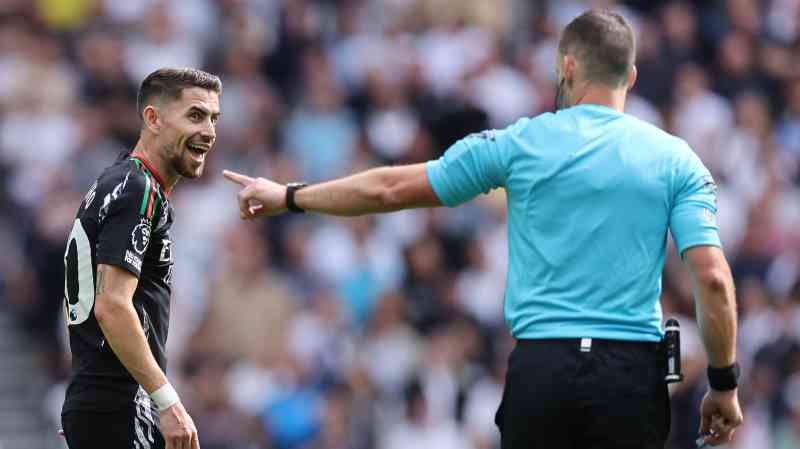The referee decision that could affect the self-employed — and Gary Lineker
Self-employed workers have been warned to brace for a crackdown that could lead to more investigations into their earnings by the tax office.
It comes after the Supreme Court last week dismissed an appeal by the football referee body over a £584,000 employment tax liability.
Professional Game Match Officials Limited (PGMOL) provides referees for all Premier League, English Football League and Football Association competitions, including the FA Cup. Some referees are permanent full-time employees, but others “referee in their spare time and usually have other full-time employment or occupations,” PGMOL told the court.
The case, which has been rumbling on for six years, centres on the employment status of 60 referees who worked for PGMOL in the 2014-15 and 2015-16 tax years. HM Revenue & Customs (HMRC) issued PGMOL with a £584,000 bill, arguing that they were effectively employees, not freelancers, and so should have been paid and taxed accordingly.

The tax office said that income tax and national insurance contributions should have been deducted from their pay instead of letting them handle their own tax affairs.
PGMOL disputed the bill in 2018 and the case was initially heard in the first-tier tribunal before eventually winding up in the Supreme Court in June 2023. Its judgment was finally issued last week, when it ruled in favour of HMRC, but fell short of making a final decision, instead referring the case back down to a lower court for reconsideration.
Waqar Shah from the law firm Kingsley Napley said that HMRC could use the court’s decision to “ramp up inquiries” into freelancers and the companies who employ them to raise extra tax revenue.Andrew Chamberlain from the Association of Independent Professionals and the Self-Employed, a not-for-profit membership organisation, said: “Simply put, this ruling is going to make it harder to be self-employed.
“HMRC, which is under pressure to close the tax gap, may feel emboldened to launch a crackdown on self-employed businesses in the hope it may be better supported by the courts.”
The case was the latest in a string of employment status hearings as HMRC has chased freelancers, celebrities and TV personalities for unpaid tax. They all stem from a complex set of off-payroll working rules (known as IR35 by HMRC), which make sure that workers who provide their services through their own intermediary company pay broadly the same income tax and national insurance as an employee would.
There are many cost benefits for keeping self-employed workers off the payroll. Freelancers who set up a company can pay themselves a small salary and take most of their income in dividends to reduce their tax bill. The tax rate on dividends is lower than on income: 8.75 per cent compared with 20 per cent income tax for basic-rate payers; 33.75 per cent for higher-rate payers compared with 40 per cent; and 39.35 per cent compared with 45 per cent for additional-rate payers.
Companies can also avoid paying employer national insurance, holiday pay or pension contributions by hiring self-employed workers.
But determining a worker’s employment status can be complicated because what constitutes an employee is not clearly defined in law. This is what has led to the legal battles with HMRC.
TV personalities including Gary Lineker, Lorraine Kelly and Adrian Chiles, who work off-payroll but do most of their work and get most of their income from one organisation or programme, have been pursued for taxes because HMRC says they should be treated as regular employees.
• Why Adrian Chiles’s £1.7m HMRC battle matters to the self-employed
In March last year Lineker won his dispute over a £4.9 million tax bill after HMRC accused him of being a disguised employee for his work with BBC and BT Sport.
In 2019 Kelly won her case over a £1.2 million bill. A judge ruled that she was a “self-employed star” rather than an ITV employee.
Chiles’s five-year-long legal battle with HMRC over a £1.7 million tax bill is still going on. In June his case was sent back to the first-tier tribunal to be reviewed again.
In the PGMOL case, the Supreme Court said it was satisfied that two of the three conditions needed to establish an employment relationship for tax purposes had been met. There was evidence of “mutuality of obligation” to provide and undertake work, and a degree of control over the referees, the court said.
But it’s not over yet — the court fell short of making a final decision on whether the referees were effectively employees and so the case has been sent back to the first-tier tribunal to be heard again. No date has yet been set but it is unlikely to be this year.
David Klass from the law firm Hill Dickinson said that even without a final resolution, the court’s decision about the contract could make it harder for self-employed people to get work.
“There is a possibility that it will influence companies to err on the side of caution, and they may be more reluctant to engage with people on a self-employed basis,” he said.
Having more workers on the payroll, with their taxes deducted automatically, would help to fill the gap between the amount of tax owed and how much is paid. The tax office estimates the tax gap was 4.8 per cent in 2022-23 — about £40 billion.
In its manifesto, Labour pledged £855 million a year to help HMRC crackdown on tax avoidance. This is expected to raise a net £5 billion a year by the end of this parliament.
“This is an area ripe for HMRC to look at and recover more taxes from,” Shah said. “Now more than ever, companies need to check the agreements they have in place with freelancers.”

Kaye Adams, who presented Loose Women on ITV, works through her own company. She was taken to court by HMRC but won three times, most recently in January after arguing that she was self-employed when she was a presenter on BBC Radio Scotland in the 2010s.
Commenting on the PGMOL case, Adams said: “What this judgment means for self-employed workers is yet more confusion. After ten years, the Supreme Court has remitted this case back to the first-tier tribunal to make a decision, meaning it is returned to the limbo land it’s been in for a decade. If this legislation is so difficult to understand and apply, surely it should be redrawn rather than endlessly thrashed out at the expense of hard-working people.”
• How do benefits and sick pay work if you’re self-employed
Matt Crawford from the tax adviser Blick Rothenberg said that freelancers caught up in IR35 legal cases may now be inclined to settle their unpaid tax bills with HMRC.
“Two or three years ago, HMRC was losing more cases than it was winning, but this trend has reversed. Those who have a first-tier tribunal case or are in disputes with HMRC may settle because they know the likelihood is HMRC will win,” he said.
HMRC said: “The ruling confirms our long-held position on employment status law and changes nothing, so we have no plans to increase investigations as a result of this judgment.”




Post Comment